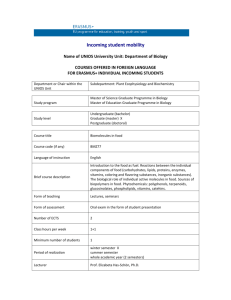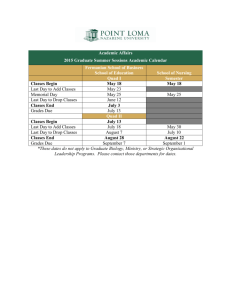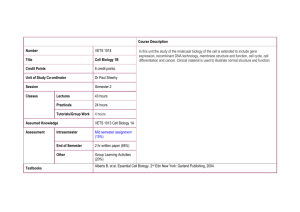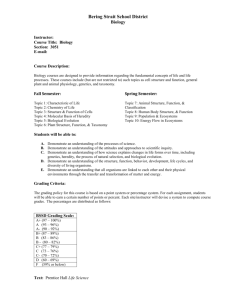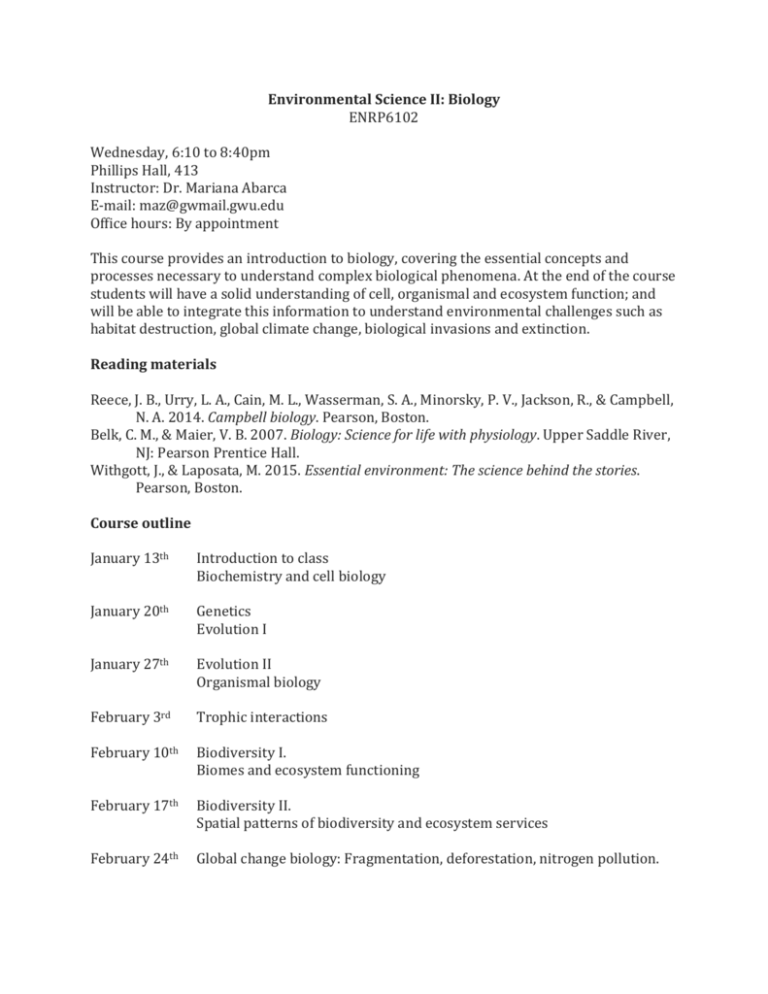
Environmental Science II: Biology
ENRP6102
Wednesday, 6:10 to 8:40pm
Phillips Hall, 413
Instructor: Dr. Mariana Abarca
E-mail: maz@gwmail.gwu.edu
Office hours: By appointment
This course provides an introduction to biology, covering the essential concepts and
processes necessary to understand complex biological phenomena. At the end of the course
students will have a solid understanding of cell, organismal and ecosystem function; and
will be able to integrate this information to understand environmental challenges such as
habitat destruction, global climate change, biological invasions and extinction.
Reading materials
Reece, J. B., Urry, L. A., Cain, M. L., Wasserman, S. A., Minorsky, P. V., Jackson, R., & Campbell,
N. A. 2014. Campbell biology. Pearson, Boston.
Belk, C. M., & Maier, V. B. 2007. Biology: Science for life with physiology. Upper Saddle River,
NJ: Pearson Prentice Hall.
Withgott, J., & Laposata, M. 2015. Essential environment: The science behind the stories.
Pearson, Boston.
Course outline
January 13th
Introduction to class
Biochemistry and cell biology
January 20th
Genetics
Evolution I
January 27th
Evolution II
Organismal biology
February 3rd
Trophic interactions
February 10th
Biodiversity I.
Biomes and ecosystem functioning
February 17th
Biodiversity II.
Spatial patterns of biodiversity and ecosystem services
February 24th
Global change biology: Fragmentation, deforestation, nitrogen pollution.
March 2nd
Global change biology II: Climate change
Mid-term exam
March 9th
Population biology
Human Populations
March 16th
Human biology
March 23rd
Environmental health and toxicology
March 30th
Spring Break, no Class
April 6th
Epidemiology
April 13th
Agriculture
April 20th
Conservation biology.
Last day of classes, term paper due!
April 26th
Make-Up day
TBA
Final examination
Evaluation
Mid-term exam: 100 points
Final exam: 100 points
Class assignments: 98 points (7 per class)
Oral presentations: 102 points
Term paper: 100 points
Total: 500 points
Additional policies and information
Blackboard: Blackboard will be used to communicate with students. Please make
sure that you can access the course and that you regularly check whatever email
account Blackboard uses for you. If you have problems with Blackboard, contact the
Helpdesk at 202-994-5530 or helpdesk.gwu.edu.
Attendance: While I won’t take attendance, you are expected to be in class each
week and there will be a graded assignment each class. If you miss a class, please
get notes from a classmate, download assigned materials from Blackboard, and
complete any pre-class work (even if it’s not graded). It’s fine to miss a class to
observe a religious holiday, but you should let me know about such cases at the start
of the semester.
Turning Things In: Unless otherwise specified, assignments are due both in
hardcopy at the start of class on the due date and as electronic files. Multi-page
assignments should be stapled; covers are unnecessary. All assignments will be
checked for plagiarism.
English for Academic Purposes Writing Support Program: If English is not your first
language, you may wish to take advantage of GW’s Writing Support Program which
offers free, one on one service. Visit http://www.gwu.edu/~gwriter for details.
Late Work: Unless you’ve made arrangements with me in advance, late work will be
penalized with a one grade step reduction (e.g. from an A- to a B+) per day.
Laptops: You are welcome to use a laptop during class to take notes or to refer to
readings. Please refrain from checking email and social media platforms; doing so is
extraordinarily distracting, both for you and for the people sitting behind you! Cell
phone use & texting is prohibited.
Collaboration: Unless specified in writing by the instructor, all assignments must be
completed by students working on their own.
Academic Honesty: All examinations, papers, and other graded work products and
assignments are to be completed in conformance with the George Washington
University Code of Academic Integrity. (See
http://www.gwu.edu/~ntegrity/code.html).
Incompletes: A student must consult with the instructor to obtain a grade of I
(incomplete) no later than the last day of classes in a semester. At that time, the
student and instructor will both sign the CCAS contract for incompletes and submit
a copy to the ENRP Director.
Grades: No grade changes can be made after the conclusion of semester, except for
clerical error.
Syllabus: This syllabus is a guide to the course. Sound educational practice requires
flexibility and the instructor may revise content and requirements during the
semester.
Accommodation for Students with Disabilities: If you need additional time or other
accommodation due to a disability, let the instructor know in first week of the class.
For accommodation on the basis of disability, you need to provide documentation to
the Office of Disability Support Services.
University Student-Support Resources: Help in addressing academic, social, and
personal issues is available 24 hours a day, 7 days a week through the University
Counseling Service which can be reached at 202 994 5300.
Grading: Grades for the course as a whole reflect the following philosophy:
A Excellent: Exceptional work for a graduate student. Work is unusually thorough,
well-reasoned, creative, methodologically sophisticated, and well written. Work is
of exceptional, professional quality.
A- Very Good: Very strong work for a graduate student. Shows signs of creativity
and a strong understanding of appropriate analytical approaches, is thorough and
well-reasoned, and meets professional standards.
B+ Good: Sound work for a graduate student; well-reasoned and thorough, without
serious analytical shortcomings. Indicates the student has fully accomplished the
basic objectives of this graduate course.
B Adequate: Competent work for a graduate student with some evident weaknesses.
Demonstrates competency in the key course objectives but the understanding or
application of some important issues is less than complete.
B- Borderline: Weak work for a graduate student but meets minimal expectations.
Understanding of key issues is incomplete. (A "B-" average in all courses is not
sufficient to sustain 'good standing.')
C+/ C / C- Deficient: Inadequate work for a graduate student; rarely meets minimal
expectations. Work is poorly developed or flawed by numerous errors and
misunderstandings of important issues.
F Unacceptable: Work fails to meet minimal expectations or course credit for a
graduate student. Performance has consistently failed to meet minimum course
requirements. Weaknesses and limitations are pervasive.


